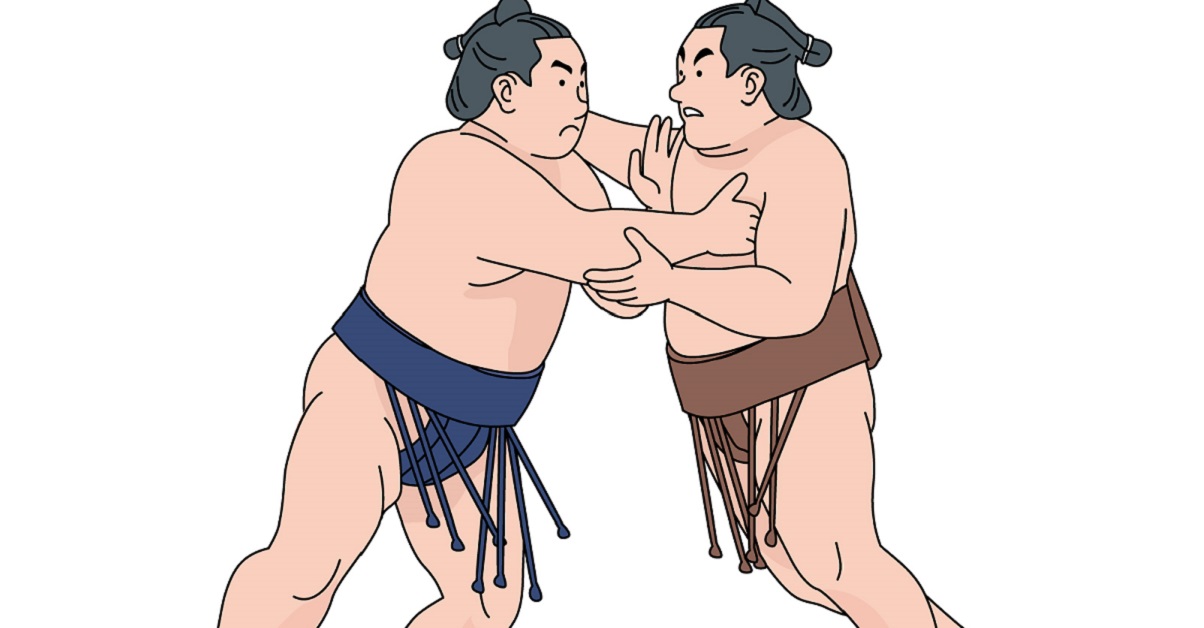In Japanese, “shoppai” usually describes salty food, but in the world of sumo it carries a completely different meaning. It is used to describe weakness or lack of skill, and in daily life it can also imply stinginess or plainness. This article explains the term in a way that is easy for beginners and foreign fans to understand.
The Basic Meaning of Shoppai
“Shoppai” is first and foremost an adjective describing salty food. For example, when soup has too much salt, one might say “this soup is shoppai.”
However, Japanese often uses words figuratively, and “shoppai” is one such case. In sumo or daily conversation, it can mean “weak,” “unsatisfactory,” or “stingy.” In this way, a word that originally referred to taste has expanded to describe a person’s skill level or personality.
Shoppai in Sumo
In sumo, when someone says a match was “shoppai,” it means the wrestler was lacking skill or appeared unprepared. Typical cases include standing too high at the initial charge, being easily pushed out, or failing to maintain balance before attempting a technique.
When spectators say “that was a shoppai bout,” they mean the fight was lacking in force and unsatisfactory. Yet the word can also carry expectation and encouragement, implying “we hope the wrestler will improve and become stronger.”
Shoppai in Everyday Conversation
Outside sumo, “shoppai” is widely used. For example, when someone is stingy with money or dislikes spending, people may say “he is shoppai.” It is a softer way to say “stingy.”
In sports or events, when the outcome is disappointing or lacks excitement, people say “that was a shoppai game” or “the event was shoppai.” Thus, in daily life, “shoppai” often means “stingy” or “disappointing,” similar to its use in sumo where it implies weakness or lack of substance.
Comparison Table of Shoppai Usage
| Context | Meaning | Example Sentence |
|---|---|---|
| Food | Salty in taste | This soup is shoppai |
| Sumo | Weak or unskilled wrestler | Today’s bout was shoppai |
| Personality | Stingy or plain | He is shoppai with money |
| Events | Unsatisfactory or disappointing | The match was shoppai and underwhelming |
Understanding Shoppai for Foreigners
For non-Japanese speakers, it may seem surprising that “shoppai” is used outside of taste. But just as the English word “salty” can mean “angry” or “grumpy” in slang, Japanese has extended the meaning of “shoppai.”
In sumo, if someone says “shoppai sumo,” it does not refer to salt levels. It means the match was immature, weak, or lacked excitement. Knowing this nuance helps foreign fans enjoy commentary and discussions around sumo.
Historical Origin and Expansion
The reason “shoppai” became common in sumo lies in Japan’s culture of figurative expression. Sumo, with its dual role as both ritual and entertainment, developed many idioms and insider terms. “Shoppai” shifted from describing taste to describing lack of ability in this context.
In recent years, the word has spread to other sports. For instance, in soccer or baseball, a disappointing game might be called “shoppai.” It has become a common way to describe something as underwhelming or failing to meet expectations.
Similar Expressions Compared
| Expression | Nuance | Use in Sumo |
|---|---|---|
| Weak | Directly states lack of power | Used, but blunt |
| Unsatisfactory | Did not meet expectations | Used for matches |
| Stingy | Too frugal with money | Daily life only |
| Shoppai | Weak, stingy, or disappointing, softer expression | Used in both sumo and daily life |
Practical Use in Sumo Commentary
Spectators or commentators might say:
- “His stance was too high, today’s sumo was shoppai.”
- “The techniques were too simple, the content was shoppai.”
Thus, “shoppai” functions as a semi-technical evaluation term in sumo. Beginners who learn this word will find it easier to follow commentary and share in the fan community’s discussions.
Broader Applications of Shoppai
| Field | Meaning | Example Sentence |
|---|---|---|
| Business | Poor outcome, low return | The project ended with a shoppai result |
| Sports | Lack of excitement, weak match | The game content was shoppai |
| Relationships | Stingy, plain in social behavior | He acts shoppai when paying at gatherings |
Conclusion
The word “shoppai” originally meant “salty,” but in sumo it means “weak” or “unskilled,” while in daily life it means “stingy” or “disappointing.”
Understanding this word allows not only deeper enjoyment of sumo but also recognition of the richness of Japanese expressions in daily conversation. For beginners and foreigners, learning “shoppai” is an important step toward understanding Japanese culture more deeply.





コメント